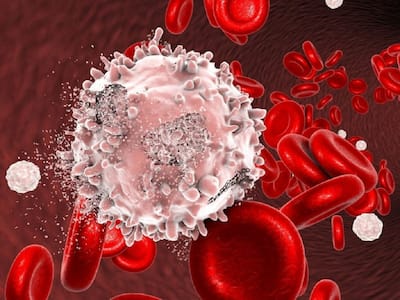
According to statistics, only about 30 per cent of patients who need a transplant are able to find a suitable donor within their own family and 70 per cent have to rely on unrelated donors.
A cancer diagnosis is traumatic. And, if it is blood cancer, it can cause a sense of desperation among patients and families. This is because this type of cancer is difficult to treat. Despite the promise of new treatments, the prognosis for blood cancer patients is often not good as most patients develop resistance to existing treatment in time. However, a 2022 study from the University of South Australia showed a way to suppress a specific protein that promotes resistance to drugs commonly used to treat Acute Myeloid Leukemia patients. This was published in the journal Blood. In another study from the Walter and Eliza Hall Institute, researchers focused on polycythemia vera (PV), a blood disorder that causes the production of excessive red blood cells. During the course of the study, they found that if they restrict iron access to the bone marrow, it was possible to induce a drop in the production of red blood cells. This could lead to a potential new treatment for patients with blood cancer.
But other than stem cell transplantation, till date, no treatment has offered a definite hope of survival. But for most patients, this treatment option is not really an option for a multitude of reasons.
Challenges in India
In India, blood cancer rates have gone up significantly over the years. More than 70 thousand people lose their lives to this disease in the country. In most of the cases, stem cell transplantation remains the last hope for survival for patients. According to statistics, only about 30 per cent of patients who need a transplant are able to find a suitable donor within their own family and 70 per cent have to rely on unrelated donors. Unfortunately, the number of blood stem cell donors are an insignificant 0.04 per cent. In other words, only 1 in a million people can find a matching donor. This shortage of suitable donors lead to a devastating loss of lives every year.
A need for awareness
Experts agree that it is crucial to spread awareness about blood cell transplantation in India. According to Dr Narendra Agarwal, Senior Consultant, Department of Hemato-Oncology & Bone Marrow Transplant, Rajiv Gandhi Cancer Institute and Research Centre, New Delhi, “Stem cell transplant has emerged as a powerful treatment modality in the battle against blood cancer. Timely interventions have shown successful treatment in 60-70 per cent of the cases. With advancements in conditioning regimens, the success rate has further soared to 80 per cent.” Dr Agarwal further goes on to say that, whatever the type of blood cancer, stem cell transplantation can regenerate a robust blood and immune system. “By raising awareness, expanding the donor registry, and fostering a culture of giving, we can overcome this hurdle and offer hope to those battling blood cancers in India,” he adds.
READ RELATED: 6 Best Steaks to Buy At Sam's Club
Need for a stem cell donor database
Because of lack of awareness and also the lack of infrastructure, stem cell donation is in its infancy in India. According to Patrick Paul, CEO, DKMS BMST Foundation India, “Every 5 minutes, a new instance of blood cancer or a blood disorder, such as Thalassemia or Aplastic Anemia, is diagnosed in India. Matching blood stem cell donors remain a critical obstacle for Indian patients seeking life-saving transplants. Today, with over 40 million registered donors worldwide, India accounts for just 0.5 million.”
What exactly are stem cell transplants?
Stem cell transplantation process involves the extraction of healthy blood-forming stem cells from a donor’s bone marrow. The donor may be a member of the patient’s family or may be an unrelated donor whose profile matches the patient. These cells are then used to replace a patient’s blood-forming stem cells. After transplantation, the stem cells grow into healthy red blood cells, white blood cells, and platelets. It is also known as bone marrow transplant because the stem cells are extracted from the bone marrow. It is a comparatively expensive treatment procedure but for end-stage blood cancer patients, it is often the only option.
Total Wellness is now just a click away.
Follow us on
window.addEventListener(‘load’, (event) => {
// $(document).ready(function(){
$(‘#commentbtn’).on(“click”,function(){
(function(d, s, id) { var js, fjs = d.getElementsByTagName(s)[0]; if (d.getElementById(id)) return; js = d.createElement(s); js.id = id; js.src = “//connect.facebook.net/en_US/sdk.js#xfbml=1&version=v2.3”; fjs.parentNode.insertBefore(js, fjs);}(document, ‘script’, ‘facebook-jssdk’));
$(“.cmntbox”).toggle();
});
// });
});







